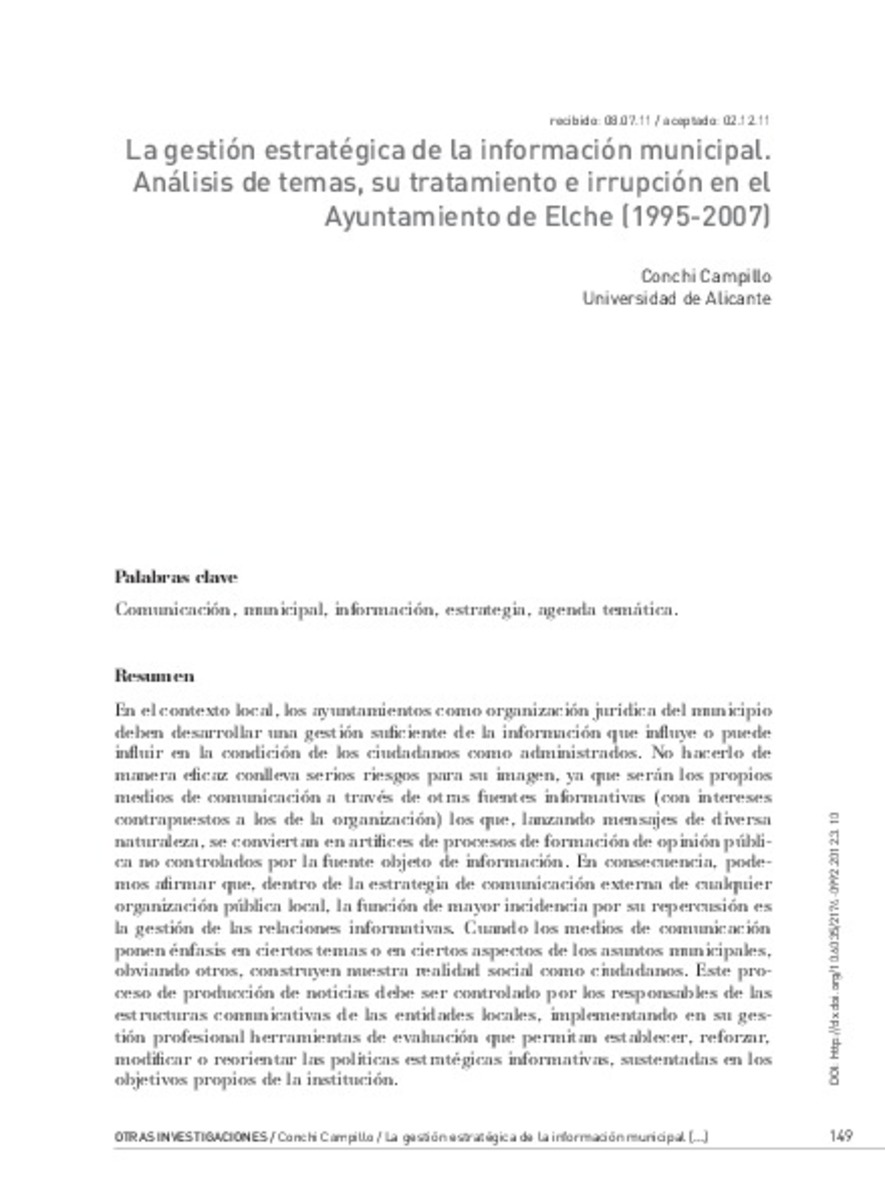| dc.contributor.author | Campillo, Conchi | |
| dc.date.accessioned | 2012-07-12T10:50:55Z | |
| dc.date.available | 2012-07-12T10:50:55Z | |
| dc.date.issued | 2012 | |
| dc.identifier.issn | 2174-0992 | |
| dc.identifier.uri | http://hdl.handle.net/10234/43041 | |
| dc.description.abstract | En el contexto local, los ayuntamientos como organización jurídica del municipio
deben desarrollar una gestión suficiente de la información que influye o puede
influir en la condición de los ciudadanos como administrados. No hacerlo de
manera eficaz conlleva serios riesgos para su imagen, ya que serán los propios
medios de comunicación a través de otras fuentes informativas (con intereses
contrapuestos a los de la organización) los que, lanzando mensajes de diversa
naturaleza, se conviertan en artífices de procesos de formación de opinión pública
no controlados por la fuente objeto de información. En consecuencia, podemos
afirmar que, dentro de la estrategia de comunicación externa de cualquier
organización pública local, la función de mayor incidencia por su repercusión es
la gestión de las relaciones informativas. Cuando los medios de comunicación
ponen énfasis en ciertos temas o en ciertos aspectos de los asuntos municipales,
obviando otros, construyen nuestra realidad social como ciudadanos. Este proceso
de producción de noticias debe ser controlado por los responsables de las
estructuras comunicativas de las entidades locales, implementando en su gestión
profesional herramientas de evaluación que permitan establecer, reforzar,
modificar o reorientar las políticas estratégicas informativas, sustentadas en los
objetivos propios de la institución. | ca_CA |
| dc.description.abstract | In the local context, the town halls like juridical organization of the municipality
they must develop a sufficient management of the information that influences
or can influence the condition of the citizens as administered. Not to do it in
an effective way, he carries serious risks for his image, since they will be the
own mass media across other informative sources (with interests opposed to
those of the organization) those who, throwing messages of diverse nature, turn
into process makers of formation of public opinion not controlled by the source
object of information. In consequence, we can affirm that, inside the strategy of
external communication of any public local organization, the function of major
incident for his repercussion is the management of the informative relations.
When the mass media put emphasis in certain topics or in certain aspects of
the municipal matters, obviating others, they construct our social reality as citizens.
This process of production of news must be controlled for the persons in
charge of the communicative structures of the local authorities, implementing in
his professional management tools of evaluation that they allow to establish, to
reinforce, to modify or to reorientate the strategic informative policies sustained
in the aims of the Institution. | ca_CA |
| dc.format.extent | 22 p. | ca_CA |
| dc.format.mimetype | application/pdf | ca_CA |
| dc.language | spa | ca_CA |
| dc.language.iso | cat | ca_CA |
| dc.publisher | AdComunica | ca_CA |
| dc.rights.uri | http://creativecommons.org/licenses/by-sa/4.0/ | * |
| dc.subject | Comunicación | ca_CA |
| dc.subject | Municipal | ca_CA |
| dc.subject | Información | ca_CA |
| dc.subject | Agenda temática | ca_CA |
| dc.subject | Estrategia | ca_CA |
| dc.subject | Communication | ca_CA |
| dc.subject | Information | ca_CA |
| dc.subject | Strategy | ca_CA |
| dc.subject | Thematization | ca_CA |
| dc.title | La gestión estratégica de la información municipal. Análisis de temas, su tratamiento e irrupción en el Ayuntamiento de Elche (1995-2007) | ca_CA |
| dc.type | info:eu-repo/semantics/article | ca_CA |
| dc.identifier.doi | http://dx.doi.org/10.6035/2174-0992.2012.3.10 | |
| dc.rights.accessRights | info:eu-repo/semantics/openAccess | ca_CA |








